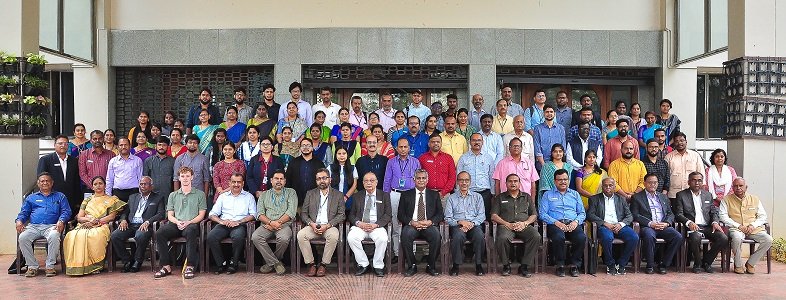International conference on Integrated Water Resources Management

Coimbatore December 2022: The participants of the Conference from different countries and states of India deliberated for two days on different water problems faced in different parts of the world, especially in the arid zone, and solutions to these problems. Several methods and techniques and approaches were highlighted for successfully implementing the integrated water resources management, considering the fact that the availability of fresh water is finite and there is a need for a participatory approach, particularly the involvement of women. The Conference highlighted the need for the application of AI, machine learning, IoT, and data analytics for the efficient development and management of water resources.
The keynote addresses in different sessions were delivered by Dr.Manoj Samuel, Executive Director, CWRDM; Mr.Theo Whitcomb, water expert, and journalist from California; Dr.Girish Gopinath, Associate Professor, Kerala University of Fisheries and Ocean Studies; Prof. Santosh Thampi, NITCalicut; Dr.MuralikrishnaIyyanki, Director, JNTU; Prof.L.Elango, Anna University, Chennai; Prof.N.Sajikumar, CEO, WRPM Consultants.
The major recommendations of the Conference are:
1. water resources management has to focus on sustainable development, allocation, and monitoring of water resources, considering social, economic, environmental, and institutional objectives.
2. The need for a participatory approach in the planning and implementation of water resources projects was highlighted considering the fact that freshwater availability is limited and water is an economic good.
3. The importance of river basin/small watershed-based water resources development was brought to light and the need for water treatment, rainwater harvesting, and artificial recharge was highlighted.
4. The session on agricultural water management recommended that efficient use of water for agriculture has to be ensured using modern irrigation practices like drip and sprinkler; the need for estimating the actual crop water requirements and irrigation scheduling using modern computational techniques was emphasized.
5. There was one unique session on the application of AI, ML, IoT, and sensors for efficient water management.
6. The significance of protecting and conserving the ecosystems, the wetlands in particular was emphasized; the session highlighted the importance of maintaining the environmental flows despite the need for irrigation and drinking water purposes.
7. The experts felt that educational programs in IWRM should be introduced in institutions of higher education and stress should be given to capacity building and awareness creation.
8. The scientists from different organizations emphasized the need for an efficient data management system and the need for resorting to computational techniques, mathematical modeling, and system studies to efficiently manage water resources.
9. Several papers highlighted the importance of emerging technologies like isotopes, remote sensing, and GIS, and mathematical modeling for better management of natural resources like land, water, and bio-resources.
